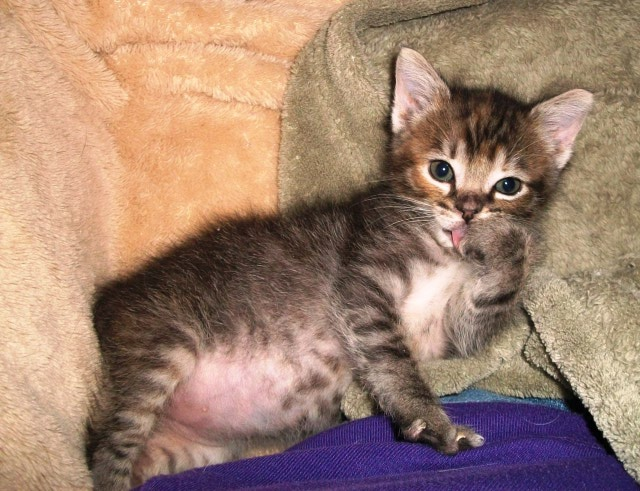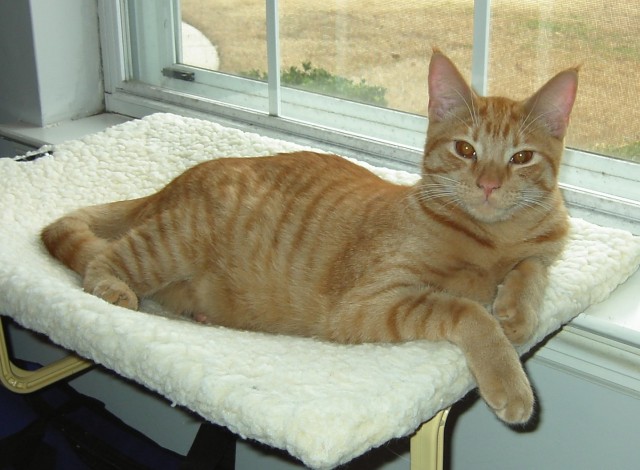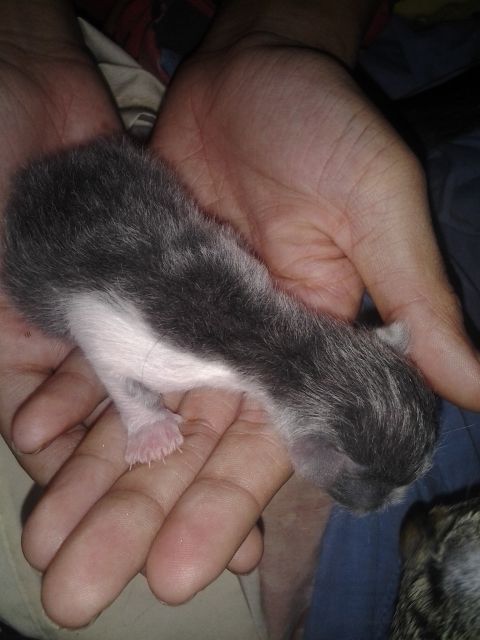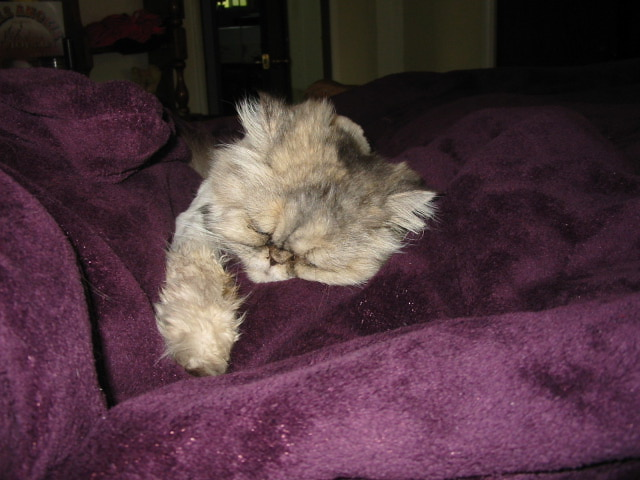QuestionI have the most bizarre situation. My cat use to be a puff ball - a big fur collar, bushy tail, the whole works. His brother wasn't quite as furry but he also had a huge mane. Within the past half year or so, they've become almost short haired cats but not patchy. I thought it might be fleas because at one point I noticed that the cat that use to be really furry had scabs on the back of his neck. I also spotted a couple of fleas so I immediately treated them with DE (Diatomaceous Earth). It seemed to remove the fleas and the scabs went away. The hair is still short though and it's quite noticeable on his tail which now looks long and skinny. The other info I have, whether helpful or not, I'm not sure, is that for at least a year now, I've noticed that these bare patches haven't gone away around their lower stomach/groin area. I assumed that was due to the initial flea issue and consequently from over licking to get rid of the itch. They are also unfortunately cooped up inside during the winter months because they hate the cold when they go outside. Licking can be a form of anxiety due to this.
The cat that use to be really furry is still on the exact brand of food he was on 4 years ago, which is the 'Urinary SO' brand so it can't be his diet. The other one has new food, still high end quality, but he's less of a concern as his appearance hasn't changed as much.
Their fur looks really healthy, they just have a shorter version of what they had previously. It's a mystery to me. I'm not sure if I should take them to the vet when they seem to be physically in good shape. They're not over or under weight. Is there any possibility that this could be worms in them, absorbing all the nutrition from their food, making them lose a thick healthy coat?
And finally, one last point that may be relevant, they are now about 6 or 7 years of age. I'm not sure if this is simply a sign of old age or not.
AnswerHi Melissa. Cats can develop food allergies over time, but if her skin isn't scabby, I'm with you that it's more likely behaviorally induced hair loss. It sounds like she may be breaking her fur off with her rough tongue, and anxiety caused by her change in routine could be the root cause. The thing that baffles me is that if she had a thick ruff around her neck and this is now gone, this isn't the "typical" pattern of behavioral hair loss. You see it on the belly, sides and hide legs mostly, since the neck area is difficult to reach. However, a few cats do scratch compulsively as well, so this doesn't rule behavioral problems out.
To try to help her cope with being indoors, see if enriching her environment does any good. Provide extra toys and scratching posts. My cats love the Fling-Ama-String and FroliCat BOLT. Fur mice are always a big hit, as well as catnip-filled pillows. Additionally, see if adding a tall sisal scratching post or two will help her release any pent up energy. A window perch might be a good idea, so she can sit and watch birds and squirrels for entertainment.
I wonder if this could be a seasonal shed. I have a cat who is long-haired in the winter and a soft short hair in the summer. And cats are shedding their winter coats just about now. However, it would be strange if she has never shedded like this before.
It it possible that this is a sign of old age, as cats tend to get less plush as they age. This is partly due to the fact that they don't absorb nutrients as well when they get older. Prescription senior formula cat foods can help address this. But I think your cats are probably still on the young side for this to have affected them yet.
Health problems might be a concern. Worms do deprive cats of nutrients, which may result in a poor coat. There is nothing wrong with deworming your cat as a precaution. I'm not sure if dewormers are available over-the-counter in Canada as they are in the U.S. It appears that you can purchase Profender, a topical dewormer that kills tapeworms, roundworms and hookworms, without a prescription at http://www.amazon.com/s/ref=nb_sb_noss?url=me%3DAV9AW5IE9W42P&field-keywords=pro... .
Another condition that can cause poor hair coat is hyperthyroidism, common in cats approaching 8-10 years of age. However, it would seem odd to me that both cats would be affected by the condition at the same time. Nevertheless, a blood test could determine if this is a factor.
Sometimes hair loss can be caused by a protein or fatty acid deficiency. This is uncommon in cats who are fed a commercial cat food, but it doesn't hurt to supplement them with some lean protein or Omega-3 Fatty Acids. Raw eggs are a good source of both protein and omega-3, and since a cat's digestive system is so acidic that it kills bacteria, and so short that any bacteria that may survive don't have time to invade it, raw eggs are not a health threat to your cat. As a precaution to yourself, you should throw out any egg your cats don't eat after 20-30 minutes. If your cats don't go for raw foods, you can also feed them several bites of boiled chicken breast a few times a day. This has a lot of protein, and omega-3 to a lesser extent. There are also omega-3 supplements on the market which include vitamins to encourage healthy fur and skin. Dermaquin by Nutramax is one such supplement.
If you end up noticing any scabbing or irritation, I would get her to the vet. This can indicate allergies, auto immune/immune-mediated disease, or mites of some kind.
Best of luck!
Jessica

 sick kitten
QuestionQUESTION: I have a 1 month old foster kitten th
sick kitten
QuestionQUESTION: I have a 1 month old foster kitten th
 old cat not eating
Questionmy cat Tootie xo
QUESTION: I have a 19 y
old cat not eating
Questionmy cat Tootie xo
QUESTION: I have a 19 y
 Lost Cat questions
QuestionRusty
QUESTION: Ali,
My new
Lost Cat questions
QuestionRusty
QUESTION: Ali,
My new
 Trouble with my Two female cats.
Question
The kitten Two Cats
Hello, I have
Trouble with my Two female cats.
Question
The kitten Two Cats
Hello, I have
 stuffy nose on my persian
QuestionTiffany
QUESTION: My cat Tiffany is 12 y
stuffy nose on my persian
QuestionTiffany
QUESTION: My cat Tiffany is 12 y